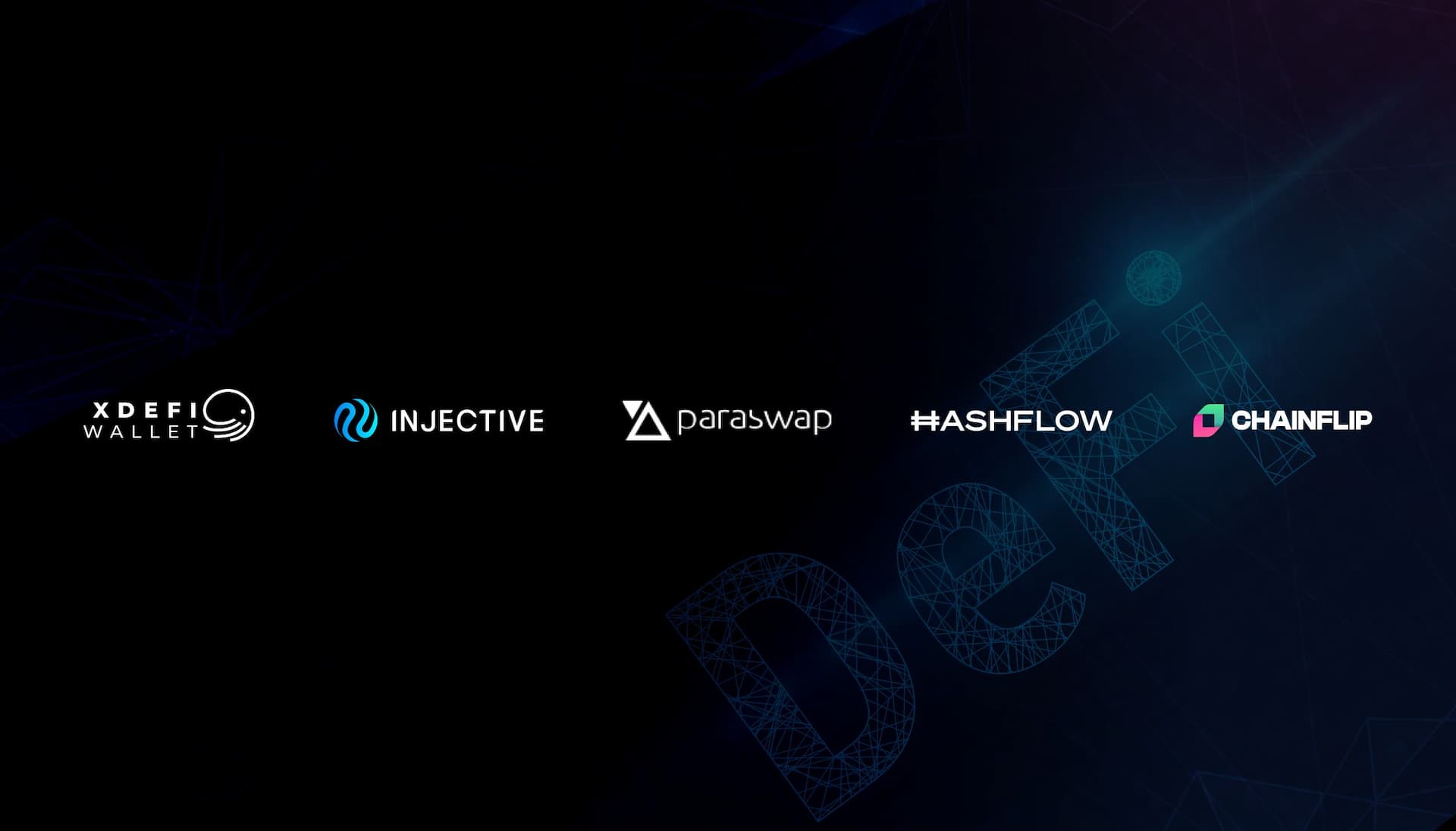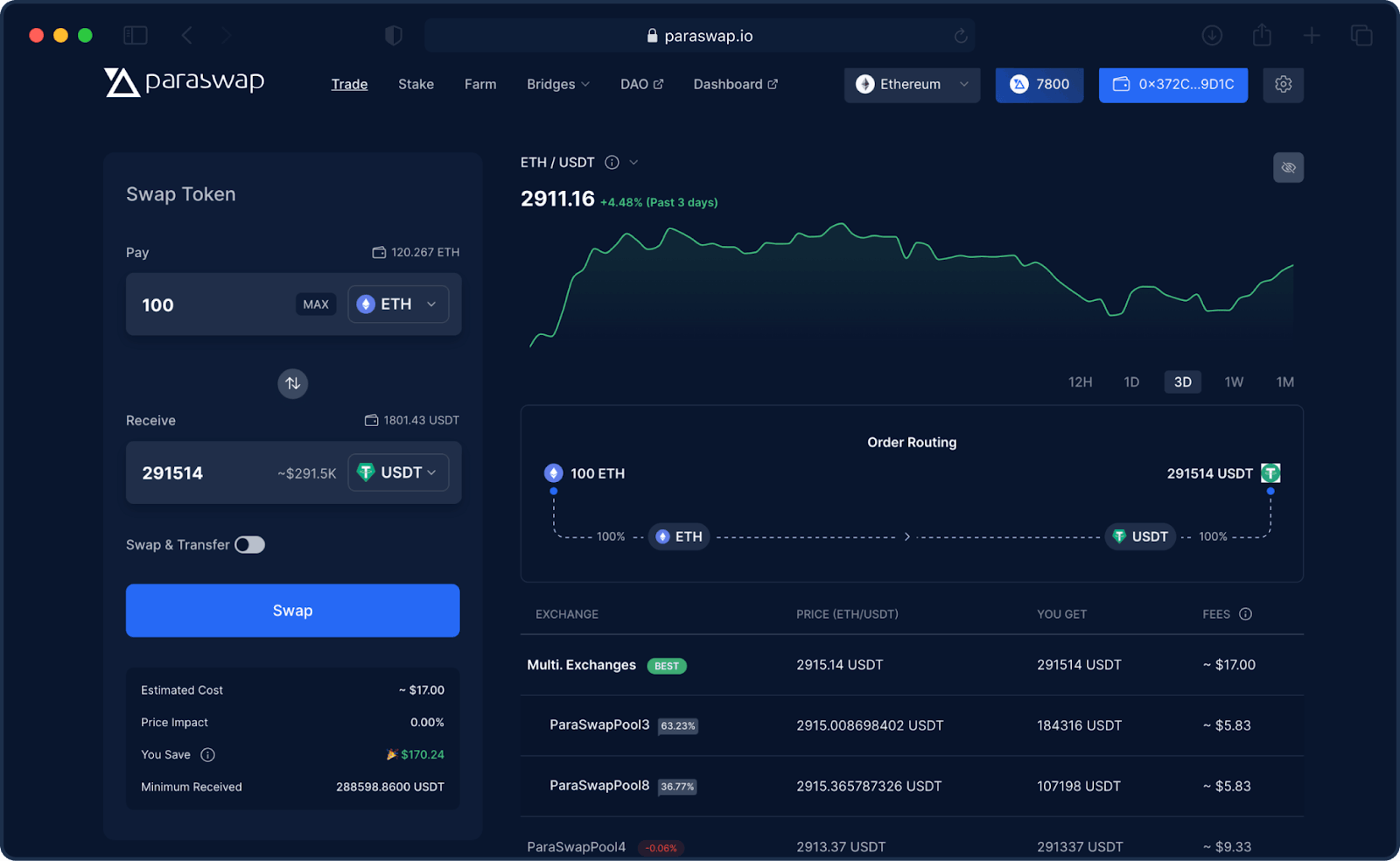
Decentralized Finance (DeFi) has revolutionized how we manage and invest our assets, providing users greater control, transparency, and accessibility. With more and more DeFi protocols arising over the past year, managing one's assets, building one’s protocol, and getting information about the market can sometimes be overwhelming.
As the DeFi ecosystem expands, it's crucial to identify and explore the top tools available in the DeFi Space. In this article, we are diving deeper into five noteworthy DeFi projects – XDEFI Wallet, Injective, Hashflow, Chainflip, and Paraswap – initiatives that have all put DeFi Development, crypto asset management, and safety at the forefront.
XDEFI Wallet - One wallet for all your crypto
XDEFI Wallet is a non-custodial multi-chain wallet addressing users' needs and is the first Chrome extension wallet to function across major blockchain frameworks. With a user-friendly interface, the XDEFI Wallet extension offers a range of features, including; aggregating balances at the asset level, displaying all NFTs from all chains in a single gallery, and offering an overview of the sum of the balance across all accounts and chains. XDEFI Wallet also offers an innovative swap functionality that brings together leading decentralized exchanges and bridges, enabling users to conveniently trade over 10,000 assets and transfer funds across different chains. Furthermore, XDEFI Wallet aims to enhance the user experience by working on gas abstraction, simplifying interaction with multiple chains, and removing the need for users to manage gas fees.
One of the standout features of XDEFI Wallet is its compatibility with multiple blockchains. It has expanded its support to include 30 chains, encompassing EVM-compatible chains, Cosmos/Tendermint, Bitcoin UTXO, Solana, and NEAR frameworks. By utilizing XDEFI's custom RPC for EVM-compatible networks and Cosmos chains, it strives to provide users access to over 180 chains by early Q3 of this year. This significant coverage makes XDEFI Wallet one of the most versatile wallets in terms of chain compatibility.
XDEFI Wallet has also announced it will release its mobile app by the end of this year, which aims to onboard more users with a seamless experience and easy-to-use interface.
Injective - The Blockchain Built for Finance
Moving on to the development and infrastructure side, Injective is making strides in providing a robust foundation for next-generation decentralized finance (DeFi) applications. The project’s core offering includes a fully decentralized on-chain order book and novel Web3 modules that support different financial products, such as exchanges, lending, derivatives, savings, insurance, options, and NFTs. Projects built on Injective operate entirely on-chain, ensuring transparency and security.
From a more technical perspective, Injective utilizes the Cosmos SDK and employs a Tendermint-based Proof-of-Stake consensus mechanism. This combination enables near-instant transaction finality and exceptional performance, with speeds surpassing 25,000 transactions per second (TPS). The platform also boasts a high degree of interoperability. It is compatible with Ethereum, seamlessly integrating Ethereum assets through its decentralized ERC-20 token bridge. It also supports IBC-enabled blockchains and non-EVM chains like Solana, expanding the network's reach and connectivity.
Injective's smart contract platform, powered by CosmWasm, enhances its interoperability by enabling multi-chain smart contract transactions. Injective's ability to automatically execute smart contracts makes it unique, setting it apart from other blockchains. This feature empowers developers to create innovative use cases previously unattainable on other chains.
The team recently announced its integration with Polygon to accelerate its cross-chain composability. This integration will allow native assets from Polygon and Injective to be utilized for diverse cross-chain use cases within the two ecosystems – meaning users can access new assets, DeFi protocols, liquidity pools, and a tightly coupled infrastructure.
Hashflow - The Future of Trading Begins Here
Hashflow is a decentralized exchange (DEX) designed with interoperability, zero slippage, and MEV-protected trades in mind. Currently, Hashflow is available across five chains – Ethereum, BNB Chain, Polygon, Avalanche, Arbitrum, and Optimism, where over $12B trades in volume have occurred since its launch back in 2021. The project uses a hybrid on-chain/off-chain Request for Quote (RFQ) engine to get off-chain quotes from market makers that manage liquidity in on-chain pools. This process allows Hashflow to protect its trades from both slippage and MEV exploits regardless of whether the trade occurs locally on one chain or across multiple chains.
There are two benefits of Hashflow’s business model. For the Traders (everyday users), Hashflow allows them to gain better prices, zero slippage, MEV- resistance, and bridgeless cross-chain swaps. Market Makers, on the other hand, can source liquidity and price assets using off-chain pricing functions instead of relying on a constant product pricing function commonly used by automated market makers (AMMs). Recently, Hashflow announced its partnership with MoonPay to simplify payment onramps globally. The partnership allows users to easily purchase digital assets and trade immediately on Hashflow using debit and credit cards from across 160 countries – thus making DeFi more accessible and striving towards more mainstream adoption.
ParaSwap - Best Prices in DeFi for Traders & dApps
ParaSwap is a decentralized protocol that serves as an aggregator for decentralized exchanges (DEXs) on the Ethereum network. Similar to how Expedia aggregates hotels from various booking sites, ParaSwap searches for token prices across popular DEXs, allowing users to find the best rates for token swaps without the need to navigate multiple platforms. ParaSwap provides a seamless trading experience while ensuring that users remain in control of their funds by offering a user-friendly interface and maintaining absolute ownership of assets.
One of the advantages of using ParaSwap is its ability to bring together liquidity from multiple exchanges. This eliminates the need for users to search for liquidity by hopping between different platforms, saving time and reducing potential slippage during swaps. Additionally, ParaSwap aims to offer better rates by splitting orders and utilizing multiple DEXs to execute trades. This approach can save users between 5% to 10% compared to direct DEX trading. Furthermore, ParaSwap minimizes fees by customizing trades based on fee variations across platforms, providing users with cost-effective transactions. Alongside its user-friendly interface, ParaSwap offers a simplified and improved DeFi experience for crypto traders.
Chainflip - The Efficient Cross-Chain Swapping Protocol
Chainflip is a decentralized exchange that operates across multiple blockchain networks. It utilizes a proof-of-stake validator network and uses threshold signing schemes for enhanced efficiency. The project has also developed a unique AMM design to provide users with a seamless and highly efficient way to trade digital assets.
Chainflip aims to minimize friction and offer a maximally efficient trading experience by operating on a fully decentralized system. Although the product is not live yet, the team has already achieved a good amount, including the complete feature set needed as the protocol's foundation. They have also completed their Testnet launch, where they improved the robust validator network that enables them to test the technology firsthand.
Furthermore, the team has raised $10M from veteran crypto VCs, including Pantera Capital, Blockchain Capital, Framework Ventures, and Morningstar Ventures.
Final Thoughts
Managing your assets in the decentralized finance landscape requires access to efficient and user-friendly tools. The abovementioned DeFi projects provide comprehensive solutions in the space. These platforms' unique features and offerings empower users to engage in decentralized lending, borrowing, trading, and yield farming, ensuring greater control and transparency over their investments. As the DeFi ecosystem continues to evolve, exploring and utilizing such tools will be instrumental in navigating the decentralized finance landscape effectively.








